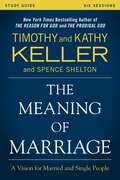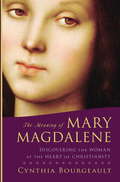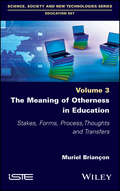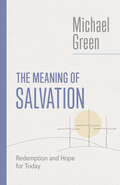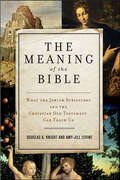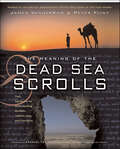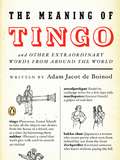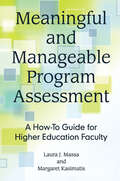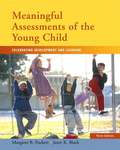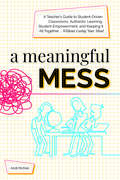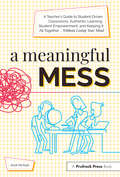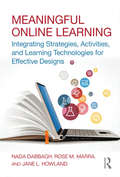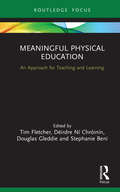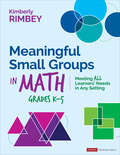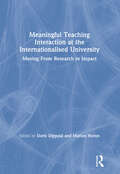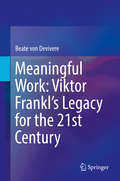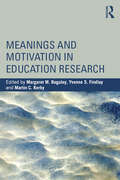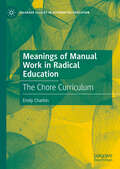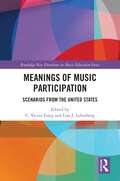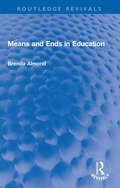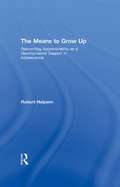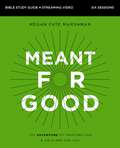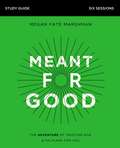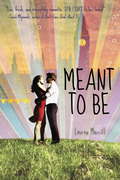- Table View
- List View
The Meaning of Marriage Study Guide: A Vision for Married and Single People
by Timothy Keller Kathy KellerTimothy and Kathy Keller will show you a portrait of marriage as it's meant to be according to the Bible...by first throwing out most of what we've been taught about love.Modern culture would have you believe that everyone has a soul mate; that romance is the most important part of a successful marriage; that marriage does not mean 'til death do us part, but merely for as long as my needs are being met; and that when serious differences arise, divorce is the best solution. But all of these modern-day assumptions miss what marriage is really about.In this six-session video-based Bible study (DVD/digital video sold separately), Timothy Keller, along with Kathy, his wife of forty years, draws a profound portrait of marriage from the pages of Scripture that neither idealizes nor rejects the institution but points us back to the relationship between God and man. The result is a vision for marriage that is refreshingly frank and unsentimental, yet hopeful and beautiful.This study is for anyone from singles to couples considering marriage to those who have been married for any length of time.Sessions include:Service: Marriage Isn't about YouCovenant: Created to Make PromisesRoles: Loving through Mutual SubmissionSingleness: Strengthening the Spiritual FamilySex: The Act of Covenant RenewalHope: Seeing the Great HorizonDesigned for use with The Meaning of Marriage Video Study (sold separately).
The Meaning of Mary Magdalene: Discovering the Woman at the Heart of Christianity
by Cynthia BourgeaultMary Magdalene is one of the most influential symbols in the history of Christianity--yet, if you look in the Bible, you'll find only a handful of verses that speak of her. How did she become such a compelling saint in the face of such paltry evidence? In her effort to answer that question, Cynthia Bourgeault examines the Bible, church tradition, art, legend, and newly discovered texts to see what's there. She then applies her own reasoning and intuition, informed by the wisdom of the ages-old Christian contemplative tradition. What emerges is a radical view of Mary Magdalene as Jesus's most important disciple, the one he considered to understand his teaching best. That teaching was characterized by a nondualistic approach to the world and by a deep understanding of the value of the feminine. Cynthia shows how an understanding of Mary Magdalene can revitalize contemporary Christianity, how Christians and others can, through her, find their way to Jesus's original teachings and apply them to their modern lives.
The Meaning of Otherness in Education: Stakes, Forms, Process, Thoughts and Transfers
by Muriel BriançonThe notion of otherness, often misused, requires important conceptualization work in order for it to be considered in all of its forms, and not simply reduced to the account of others. Although otherness certainly questions the link to the other (relation), it also questions the link to the self (reflexivity) and the link to knowledge (epistemology). Being tridimensional, the process of otherness is a paradox, the meaning of which can only be drawn thanks to ethics, psychoanalytical orientation and the history of philosophical ideas. This book, which relates to philosophy of education, seeks to explain the problematic notion of otherness, the desire for which is specific to humankind. It examines how otherness questions the limits of knowledge, transmission and language, and argues that it is in fact a value, a tool and practice for all the actors involved in the relationship between education, knowledge and care.
The Meaning of Salvation: Redemption and Hope for Today (The Eerdmans Michael Green Collection)
by Michael GreenMichael Green shines a light on salvation as it appears in Scripture and in our lives. In this perennial classic of soteriology, Michael Green explores the deeply human longing for salvation. But what did salvation mean to Jewish and Gentile people at the time of Jesus? Green traces salvation through the Old Testament, first-century Greco-Roman sources, and the New Testament. What emerges is the conviction that salvation is not just a hope for the future, but an offer of redemptive grace for the here and now. In a culture increasingly rife with despair and anxiety, Green&’s timeless work offers a message of hope in the good news of Jesus Christ. &“There are few ways in which the Church could better serve this generation than by recovery, a translation into modern idiom, and a bold proclamation of the wonderfully comprehensive message of salvation contained in the Scriptures.&”
The Meaning of the Bible: What the Jewish Scriptures and Christian Old Testament Can Teach Us
by Douglas A. Knight Amy-Jill Levine“Both enlightening and inspiring . . . a helpful resource for both Jews and Christians, conservatives and liberals, religious leaders and social reformers.” —Peter J. Paris, the Elmer G. Homrighausen Professor of Christian Social Ethics, emeritus, Princeton Theological SeminaryIn The Meaning of the Bible: What the Jewish Scriptures and Christian Old Testament Can Teach Us, preeminent biblical scholars Douglas A. Knight and Amy-Jill Levine deliver a broad and engaging introduction to the Old Testament—also known as the Tanakh or Hebrew Bible—offering a wealth of compelling historical background and context for the sacred literature that is at the heart of Judaism and Christianity. John Shelby Spong, author of Why Christianity Must Change or Die writes, “Levine and Knight have combined to write a book on the Bible that is as academically brilliant as it is marvelously entertaining. By placing our scriptures into their original Jewish context they have opened up startling and profound new insights. This is a terrific book.”“A winsome, accessible introduction to the theological thought of the Hebrew Bible. This sort of irenic, thoughtful linkage of criticism and interpretation within a confessing tradition is exactly what we most need in Scripture reading.” —Walter Brueggemann, Professor Emeritus, Columbia Theological Seminary“From its superb introduction to its perfectly worded conclusion, this book does it all. Whether your interest in the Bible is historical or literary, specific texts or broad themes, this book has it—and conveys its relevance for today.” —Richard Elliott Friedman, author of Commentary on the Torah“More than random facts about the Hebrew Bible . . . more than a historical overview . . . they are aiming for true understanding of the life, culture, and practices of the ancient Israelites.” —Booklist
The Meaning of the Dead Sea Scrolls: Their Significance For Understanding the Bible, Judaism, Jesus, and Christianity
by James C. Vanderkam Peter FlintThe Dead Sea Scrolls, found in caves near the Dead Sea fifteen miles east of Jerusalem from 1947 to 1956, include the oldest existing biblical manuscripts and the remarkable texts of the purist Jewish community at Qumran. The discovery of the scrolls has added dramatically to our understanding of the varieties of Judaism at the time of Jesus and the rise of Christianity, but has also prompted heated debate about the nature of these religions. As the monumental task of transcribing and translating the Dead Sea Scrolls is finally completed, people around the world are taking stock of the significance of these ancient documents. In this book, two of the world's leading experts on the scrolls reveal the complete and fascinating story in all its detail: the amazing discovery, the intense controversies, and the significant revelations.Drawing together all the evidence, this timely book explores: The discovery and dating of the scrolls Their relationship to the Hebrew Bible, Apocrypha, and New Testament Their messianic and apocalyptic messages The identity, nature, and theology of the Qumran community The nonbiblical scrolls Controversies surrounding the scrollsThis comprehensive, up-to-date guide is the definitive introduction to all aspects of the scrolls, including their teachings, the community that created them, the world of Judaism, the origins of Christianity, our understanding of Jesus and the New Testament. Featuring photos of the original texts, the sites, and the scholars who deciphered them, and including illustrative passages from the scrolls, The Meaning of the Dead Sea Scrolls presents the most complete and accurate scholarship on the Dead Sea Scrolls available today.
The Meaning of Tingo
by Adam Jacot de BoinodDid you know that people in Indonesia have a word that means 'to take off your clothes in order to dance'? Or how many words the Albanians have for eyebrows and moustaches? Or that the Dutch word for skimming stones is plimpplamppletteren? Drawing on the collective wisdom of over 154 languages, this intriguing book is arranged by theme so you can compare attitudes all over the world to such subjects as food, the human body and the battle of the sexes. Here you can find not only those words for which there is no direct counterpart in English (such as the Japanese age-otori which means looking less attractive after a haircut), but also a frank discussion of exactly how many 'Eskimo' terms there are for snow, and a vast array of information exploring the wonderful and often downright strange world of words. Oh, and tingo means 'to take all the objects one desires from the house of a friend, one at a time, by asking to borrow them'.
Meaningful and Manageable Program Assessment: A How-To Guide for Higher Education Faculty
by Laura J. Massa Margaret KasimatisIn this book, the authors provide readers with a straightforward approach to doing assessment in a way that is meaningful, manageable, and sustainable over time. Including a straightforward overview of assessment concepts and principles and practical, easy-to-follow instructions for multiple assessment tools and key steps in the assessment process, this book is a handy, all-in-one how-to guide. In addition, the text guides readers toward the development of a culture of assessment. Writing in a conversational tone that has helped the authors to successfully teach assessment principles and practices to faculty and administrators from a variety of academic disciplines and institutions, the book reads as if a friendly, supportive assessment professional is by your side.The book begins with an overview of the assessment process and key assessment concepts and principles. Subsequent modules provide detailed instructions and specific tips for carrying out each step of the process, including three modules focused on creating and implementing specific assessment measurement tools. The authors recommend readers begin by reading Module 1, which provides a framework that will enhance understanding of each of the steps of the process that are spelled out in detail in subsequent modules. However, after that, each of the modules is designed to stand alone. Readers need not read the modules in order nor do they need to read all of them in order to benefit from the authors’ guidance. In addition, the authors have created a video to accompany Module 10 in which they take readers step-by-step through the use of Excel spreadsheets to organize and present assessment data.
Meaningful Assessments of the Young Child: Celebrating Development and Learning
by Margaret Puckett Janet BlackThis book is not for the “tired and timid” but for those committed professionals who wish to think through a plan that is coherent, cohesive, learner- and family-focused, and work through the development of a defensible (reliable and valid) authentic assessment system. Discusses emerging research in the area of brain development research and its implication for assessment practices. Provides information on the “standards movement” and how these standards can have either a negative or positive impact on developmental goals. Adds a developmental continuum as an appendix to help teachers focus on emerging development rather than on perceived deficits in children. Provides an added chapter on portfolio systems. Places more emphasis on the discussions of diversity and inclusion. For educators and school administrators.
A Meaningful Mess: A Teacher's Guide to Student-Driven Classrooms, Authentic Learning, Student Empowerment, and Keeping It All Together Without Losing Your Mind
by Andi McNairThere is no successful business in the world that continues to do something that is not working for its customers. Unfortunately, education is not working for today's students. A Meaningful MessHow do you organize what may seem like a chaotic mess into a classroom that empowers students to engage with content and pursue their passions? A Meaningful Mess offers suggestions and specific tools that can be used to engage this generation of students in meaningful, relevant, and student-driven learning experiences—even if things in the classroom may get messy, both literally and figuratively. Such strategies and tools include Genius Hour, Makerspaces, flexible learning spaces, meaningful technology, global learning experiences, critical and creative thinking, collaboration, and reflection. Packed with relevant evidence and research , A Meaningful Mess helps teachers understand why traditional teaching strategies are no longer working and what they can do to engage and empower this generation of learners.em> is written for teachers who want what is best for their students despite the current culture of compliance and a belief that school cannot be fun for today's learners. School should be a place where students and teachers all want to be. To address this need, the book offers suggestions and specific tools that be can be used to engage this generation of students in meaningful, relevant, and student-driven learning experiences—even if things in the classroom may get messy, both literally and figuratively. Such strategies and tools include Genius Hour, Makerspaces, flexible learning spaces, meaningful technology, global learning experiences, critical and creative thinking, collaboration, and reflection. Packed with relevant evidence and research, "A Meaningful Mess" helps teachers understand why traditional teaching strategies are no longer working and what they can do to engage and empower this generation of learners.
A Meaningful Mess: A Teacher's Guide to Student-Driven Classrooms, Authentic Learning, Student Empowerment, and Keeping It All Together Without Losing Your Mind
by Andi McNairHow do you organize what may seem like a chaotic mess into a classroom that empowers students to engage with content and pursue their passions? A Meaningful Mess offers suggestions and specific tools that can be used to engage this generation of students in meaningful, relevant, and student-driven learning experiences—even if things in the classroom may get messy, both literally and figuratively. Such strategies and tools include Genius Hour, Makerspaces, flexible learning spaces, meaningful technology, global learning experiences, critical and creative thinking, collaboration, and reflection. Packed with relevant evidence and research, A Meaningful Mess helps teachers understand why traditional teaching strategies are no longer working and what they can do to engage and empower this generation of learners.
Meaningful Online Learning: Integrating Strategies, Activities, and Learning Technologies for Effective Designs
by Nada Dabbagh Rose M. Marra Jane L. HowlandMeaningful Online Learning explores the design and facilitation of high-quality online learning experiences and outcomes through the integration of theory-based instructional strategies, learning activities, and proven educational technologies. Building on the authors’ years of synthesized research and expertise, this textbook prepares instructors in training to create, deliver, and evaluate learner-centered online pedagogies. Pre- and in-service K–12 teachers, higher education faculty, and instructional designers in private, corporate, or government settings will find a comprehensive approach and support system for their design efforts.
Meaningful Physical Education: An Approach for Teaching and Learning (Routledge Focus on Sport Pedagogy)
by Tim Fletcher; Déirdre Ní Chróinín; Douglas Gleddie; Stephanie BeniThis book outlines an approach to teaching and learning in physical education that prioritises meaningful experiences for pupils, using case studies to illustrate how practitioners have implemented this approach across international contexts. Prioritising the idea of meaningfulness positions movement as a primary way to enrich the quality of young people’s lives, shifting the focus of physical education programs to better suit the needs of contemporary young learners and resist the utilitarian health-oriented views of physical education that currently predominate in many schools and policy documents. The book draws on the philosophy of physical education to articulate the main rationale for prioritising meaningful experiences, before identifying potential and desired outcomes for participants. It highlights the distinct characteristics of meaningful physical education and its content, and outlines teaching and learning principles and strategies, supported by pedagogical cases that show what meaningful physical education can look like in school-based teaching and in higher education-based teacher education. With an emphasis on good pedagogical practice, this is essential reading for all pre-service and in-service physical education teachers or coaches working in youth sport.
Meaningful Small Groups in Math, Grades K-5: Meeting All Learners’ Needs in Any Setting (Corwin Mathematics Series)
by Kimberly Ann RimbeyTarget the Math…Support the Students…Provide Access for All The need for focused small group math instruction has never been greater. Today’s education landscape is fraught with learning divides unlike anything we’ve faced in recent years. We need new ways of teaching students who have remarkably varying levels of understanding and vastly different needs. Meaningful Small Groups in Math, Grades K-5 offers practical guidance on how to meet the diverse needs of today’s students. Written for K-5 classroom teachers, math interventionists and instructional coaches, this user-friendly, accessible book provides guidance on the necessary components of small group instruction in math, trajectories for small-group instruction on specific concepts, and practical steps for getting started. Readers will find Checklists and templates for implementing small group, sample lessons in the major content domains Emphasis on flexible groups Intervention and extension ideas for differentiating learning A chapter devoted to developing small-group programs across a school or organization Small group instruction in mathematics has not been as well-developed as its counterpart in the reading world. In K-5 math classrooms, small-group instruction has typically been reduced to learning centers and rotation stations, with little emphasis on differentiated, small-group, teacher-facilitated learning. To meet the needs of today’s students, a more focused approach is needed.
Meaningful Small Groups in Math, Grades K-5: Meeting All Learners’ Needs in Any Setting (Corwin Mathematics Series)
by Kimberly Ann RimbeyTarget the Math…Support the Students…Provide Access for All The need for focused small group math instruction has never been greater. Today’s education landscape is fraught with learning divides unlike anything we’ve faced in recent years. We need new ways of teaching students who have remarkably varying levels of understanding and vastly different needs. Meaningful Small Groups in Math, Grades K-5 offers practical guidance on how to meet the diverse needs of today’s students. Written for K-5 classroom teachers, math interventionists and instructional coaches, this user-friendly, accessible book provides guidance on the necessary components of small group instruction in math, trajectories for small-group instruction on specific concepts, and practical steps for getting started. Readers will find Checklists and templates for implementing small group, sample lessons in the major content domains Emphasis on flexible groups Intervention and extension ideas for differentiating learning A chapter devoted to developing small-group programs across a school or organization Small group instruction in mathematics has not been as well-developed as its counterpart in the reading world. In K-5 math classrooms, small-group instruction has typically been reduced to learning centers and rotation stations, with little emphasis on differentiated, small-group, teacher-facilitated learning. To meet the needs of today’s students, a more focused approach is needed.
Meaningful Teaching Interaction at the Internationalised University: Moving From Research to Impact
by Doris DippoldThis edited collection draws together the latest thinking, research and practical case studies related to classroom interaction at internationalised universities. Through evidence-based approaches which involve the analysis of and reflection on classroom interaction practices, this book examines issues related to classroom interaction in disciplinary higher education contexts, whilst addressing the question of how teachers and students can develop their ability in orchestrating and taking part in classroom interaction. Covering topics such as classroom interactional competence, ‘silent’ students, interaction and integration in multicultural classes, social factors in classroom talk, group interaction, oracy development and anti-bullying interventions, this title is ideal reading for postgraduate students, teacher trainers in higher education, scholars and researchers and anyone interested in higher education pedagogy and its development.
Meaningful Work: Viktor Frankl’s Legacy for the 21st Century
by Beate Von DevivereThis book offers meaningful work as one of the most relevant issues for 21st century workplaces, and organizations seeking to develop leadership and drive positive change. It uses Viktor Frankl’s legacy as a scientific and philosophical pioneer, while combining cutting edge research findings from the behavioural sciences, organizational and management research, and human resource development with outstanding examples of new work approaches of leadership from around the globe. In order to respond to 21st century demands on meaningful work, this book harnesses the power of living meaning, values, purpose and compassion in workplaces. Beate von Devivere shows managers, human resources experts, consultants, coaches, medical experts, students and counsellors as well as all dedicated individuals, how to find meaning in their organizations, their teams and individual functions and challenges, bringing Viktor Frankl’s approach to today’s workplaces. Integrating a wide range of knowledge and expertise, this book covers organizational development, management practice, and findings from psychology, neuroscience as well as therapeutic approaches and new work concepts. Meaningful work is promoting an integrated approach for the ‘Copernican turn’, further promoting meaningful work, purpose and a good life.
Meanings and Motivation in Education Research
by Martin C. Kerby Yvonne S. Findlay Margaret M. BaguleyMeanings and Motivation in Education Research demonstrates the vibrant and vital connection between the researcher and their research. Research is often perceived as an entity which is seemingly produced in isolation; however, there are many important factors which are involved, and this book explores the complexities of investigating the specific areas of meaning and motivation for researchers working in the education sector. With contributions from authors drawn from the field of education in various stages of their career, the perspectives shared in this book are from a diverse range of countries including Australia, Canada, Malaysia, the United Kingdom and the United States of America. Key topics include: personal and professional identity narrative inquiry as method teacher educators as researchers conducting education research mixed methods in educational research Foregrounding the personal experiences, interests and motivations of educational researchers Meanings and Motivation in Education Research proves important insights into current discussions in educational research including researchers’ identities, the ways they conduct research and most importantly the impact institutional and personal politics have on their work. This will be a valuable text for educators, education researchers, policy-makers and practitioners across the globe.
Meanings of Manual Work in Radical Education: The Chore Curriculum (Palgrave Studies in Alternative Education)
by Emily CharkinThis book aims to challenge and inspire readers with lived examples of alternatives to current paradigms in education, childhood and community, through new research into two important and neglected schools in the history of progressive and radical education. Kilguhanity and Wennington schools were both founded in the UK in 1940, and at both schools pupils and staff were extensively involved in the manual work of looking after and shaping the physical fabric of the community. The author uses these case studies to challenge the tendency to equate pupil participation with ‘voice’ and ‘meetings’, and casts light on a fault line within the progressive and radical traditions. She then presents new challenges and perspectives to ongoing debates about education and childhood, unsettling the stalemate between liberal and traditional, and progressive and radical schools by uncovering a community-based alternative. The book offers a contribution to a growing body of contemporary research literature on progressive and radical education, alternative education, informal education and social pedagogy as well as across the disciplines of childhood studies, history, philosophy and geography.
Meanings of Music Participation: Scenarios from the United States (Routledge New Directions in Music Education Series)
by C. Victor Fung Lisa J. LehmbergThis book uncovers the multifaceted nature of music participation through a collection of studies in a wide variety of musical contexts across the United States. The contributors combine personal voices and vivid narratives with scholarship to present many potential meanings of music participation, and lay out research-based implications for lifelong music education. Exploring music participation in choral and instrumental ensembles; school music classes and community groups; in-person and virtual spaces; among children, young adults, and older adults; and for native-born citizens and immigrants, the 10 original studies in this volume present a diverse portrait of musical engagement. The chapters draw out themes including enjoyment, identity development, learner autonomy, social interaction, motivation, commitment, and quality of life, and draw connections between musical meanings and philosophical principles from both Western and Eastern traditions. Linked by interludes that connect the empirical studies with philosophical interpretations, this volume brings together multiple methodologies and perspectives to consider the social, cultural, and psychological meanings of lifelong music participation. It offers a valuable resource for scholars, professionals, and students working in school and community music or music education research, as well as readers interested in general education, social psychology, lifelong learning, and aging studies.
Means and Ends in Education (Routledge Revivals)
by Brenda AlmondFirst published in 1982, Means and Ends in Education explores the contrasts between approaches to teaching where teaching is simply a means to some other end; approaches in which the end determines the means; and approaches in which means and ends are integrated and education serves an intrinsic purpose. The book considers the concept of education and evaluates different processes and techniques of teaching and learning. Divided into three parts, it covers instrumentalist approaches, learner-oriented approaches, and liberal approaches to education. It puts forward differing views as to what the term ‘education’ means to different professions and in different contexts, and how different approaches result in a very different experience for the recipient. It also discusses the extent to which an evaluation of methods of education and an evaluation of the aims of education are linked. Means and Ends in Education will appeal to those with an interest in the philosophy of education.
The Means to Grow Up: Reinventing Apprenticeship as a Developmental Support in Adolescence (Critical Youth Studies)
by Robert HalpernIn The Means to Grow Up, Robert Halpern describes the pedagogical importance of "apprenticeship"—a growing movement based in schools, youth-serving organizations, and arts, civic, and other cultural institutions. This movement aims to re-engage youth through in-depth learning and unique experiences under the guidance of skilled professionals. Employing a "pedagogy of apprenticeship," these experiences combine specific, visceral, and sometimes messy work with opportunity for self-expression, increasing responsibility, and exposure to the adult world. Grounded in ethnographic studies, The Means to Grow Up illustrates how students work in unique ways around these meaningful activities and projects across a range of disciplines. Participation in these efforts strengthens skills, dispositions, and self-knowledge that is critical to future schooling and work, renews young peoples’ sense of vitality, and fosters a grounded sense of accomplishment. In unearthing the complexities of apprenticeship learning, Halpern challenges the education system that is increasingly geared towards the acquisition of de-contextualized skills. Instead, he reveals how learning alongside experienced adults can be a profoundly challenging and complex endeavor for adolescents and offers readers an exciting vision of what education can and should be about.
Meant for Good Bible Study Guide plus Streaming Video: The Adventure of Trusting God and His Plans for You
by Megan Fate MarshmanMeant for Good is a power-packed, video-based Bible study that looks at the truth that you can trust God's plans for your life—no matter what it looks like right now. Dynamic Bible teacher Megan Fate Marshman will help you and your group discover how to step into the hopeful future God has for you.Redefine your perspective on who and what matter most in your life. With authenticity and revealing insights into the character of God, Megan unpacks Jeremiah 29:11–14 and what exactly is meant by "good" from God's perspective. This Bible study will teach you that trusting God with everything—yes, EVERYTHING—is a life of adventure you simply couldn't plan for yourself.This study guide includes:Individual access to six streaming video teachings from MeganEngaging and evocative group discussion questions and activitiesIn-depth personal Bible study sessionsA section to track your experience as you grow in new spiritual practicesA series of spiritual formation practices for you to carry on well beyond the studyStreaming video access included. Access code subject to expiration after 12/31/2029. Code may be redeemed only by the recipient of this package. Code may not be transferred or sold separately from this package. Internet connection required. Void where prohibited, taxed, or restricted by law. Additional offer details inside.
Meant for Good Study Guide: The Adventure of Trusting God and His Plans for You
by Megan Fate MarshmanMeant for Good is a power-packed, biblical look at the truth that you really can trust God's plan for your life—no matter what your life looks like right now. Dynamic Bible teacher Megan Fate Marshman will help you discover how to stop discounting yourself from a hopeful future, start living in active dependence on God, and find your way to the perfect plan He has for you in this six-session video Bible study (DVD/digital downloads sold separately). With authenticity and revelatory insights into the character of Jesus, Megan shares an engaging and fresh look at the core themes within the well-loved scripture of Jeremiah 29:11-14. Through winsome and inspiring stories, Meant for Good will show you how to trust God in your daily life, and more importantly, how to trust God's definition of good above your own.In this six-session video Bible study you will discover:The deeper truth behind Jeremiah 29:11-14 and gain profound perspective into trusting God in new ways. That your not-enoughness is exactly enough to God, and that in fact, you have everything you need to take that first step into the life God has for you.How to stop counting yourself out, because Jesus never has. God is up to something really good, and He's inviting you to join Him.How to hear and respond to God's voice, and intentionally grow a personal, intimate relationship with Him.How to defeat anxiety, trust God with all you're carrying and worrying about, and experience a life of freedom in relying on God's perfect control.Designed for use with the Meant for Good Video Study (sold separately).
Meant to Be
by Lauren MorrillMeant to be or not meant to be . . . that is the question. It's one thing to fall head over heels into a puddle of hazelnut coffee, and quite another to fall for the--gasp--wrong guy. Straight-A junior Julia may be accident prone, but she's queen of following rules and being prepared. That's why she keeps a pencil sharpener in her purse and a pocket Shakespeare in her, well, pocket. And that's also why she's chosen Mark Bixford, her childhood crush, as her MTB ("meant to be").But this spring break, Julia's rules are about to get defenestrated (SAT word: to be thrown from a window) when she's partnered with her personal nemesis, class-clown Jason, on a school trip to London. After one wild party, Julia starts receiving romantic texts . . . from an unknown number! Jason promises to help discover the identity of her mysterious new suitor if she agrees to break a few rules along the way. And thus begins a wild goose chase through London, leading Julia closer and closer to the biggest surprise of all: true love.Because sometimes the things you least expect are the most meant to be.
